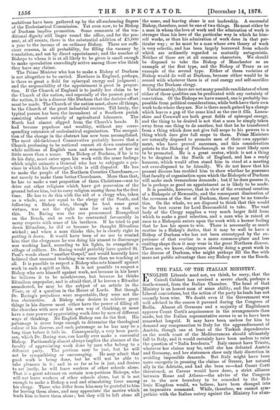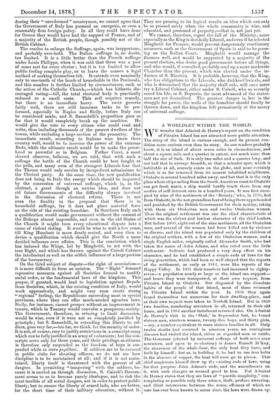THE FALL OF THE ITALIAN MINISTRY.
ENGLISH Liberals need not, we think, be sorry, that the Cairoli Cabinet has received a severe check, perhaps a death-wound, from the Italian Chamber. The head of that Ministry is an honest man of some ability, and the strongest Liberal convictions, but the action of the party he leads has not recently been wise. We doubt even if the Government was well advised in the course it pursued during the Congress of Berlin. Almost all Germans and a majority of Englishmen approve Count Corti's acquiescence in the arrangements then made, but the Italian representative seems to us to have been somewhat languid. It may have been useless for him to demand any compensation to Italy for the aggrandisement of Austria, though one at least of the Turkish dependencies on the south coast of the Mediterranean should ultimately fall to Italy, and it would certainly have been useless to raise the question of "Italia Irredenta." Italy cannot have Trieste, whatever her claims may be, until she has defeated Austria and Germany, and her statesmen show only their discretion in avoiding impossible demands. But Italy might have been more energetic in pressing the claims of Greece, her natural ally in the Adriatic, and had she been so—had Count Corti threatened, as Cavour would have done, a strict alliance between Rome and Athens—the advice of the Congress as to the new boundary to be conceded to the Hel- lenic Kingdom would, we believe, have been changed into an imperative command. While, therefore we cannot sym- pathise with the Italian outcry against the therefore, for aban- doning their " unredeemed " countrymen, we cannot agree that the Government of Italy has pursued an energetic, or even a reasonably firm foreign policy. In all they could have done for Greece they would have had the support of France, and of a majority of the British people, though possibly not of the British Cabinet.
The resolve to enlarge the Suffrage, again, was inopportune, and probably over-bold. The Italian suffrage is, no doubt, too limited. It is a little better than the French suffrage under Louis Philippe, when it was said that there was a post of some sort for every elector ; but it is too limited to allow public feeling complete play, or to leave the masses a legal method of making themselves felt. It extends even nominally only to one-tenth of the heads of households in the Peninsula, and this number is further limited by circumstances, such as the action of the Catholic Church,—which has hitherto dis- couraged voting—till, the total electoral body is practically reduced to a small caste. This evil requires remedy, but there is no immediate hurry. The caste governs fairly well, there are still immense tasks to be per- formed, especially in Naples and Sicily, before Italy can be considered made, and S. Zanardelli's proposition goes so far that it would completely break up the machine. He would give the vote to every citizen who could read and write, thus including thousands of the poorest dwellers of the towns, while excluding a large section of the peasantry. The immediate result, according to Italians who know their country well, would be to increase the power of the extreme Reds, while the ultimate result would be to make the priest- hood as powerful as in Belgium. Father Curci, a most shrewd observer, believes, we are told, that with such a suffrage the battle of the Church could be best fought at the polls, and many even of the strongest Liberals fear that the Throne would only survive by inexpedient submissions to the Clerical party. At the same time, the new qualification does not bring to Italy the energy which should be imparted by the concession of universal suffrage, which is, in the abstract, a great though an unwise idea, and does not rid future Governments of the difficulty always involved in the discussion of electoral reform. There is not even the finality in the proposal that there is in household suffrage, for it does not place material force on the side of the existing franchise. In Southern Italy such a qualification would make government without the consent of the Bishops almost impossible, and even in the old States of the Church it might turn every educational dispute into a cause of violent rioting. It would be wise to wait a few years, till King Humbert is more firmly seated, and even then to devise a qualification which should give the North a more decided influence over affairs. This is the conviction which has induced the Whigs, led by Minghetti, to act with the true Right, and which has thrown against the Cairoli Cabinet the intellectual as well as the selfish influence of a large portion of the bureaucracy.
On the third subject of dispute—the right of association— it is more difficult to form an opinion. The " Right " demand repressive measures against all Societies formed to modify social order, or the fundamental laws of the kingdom. This prayer, if granted, would lead to legislation against Repub- lican Societies, which, in the existing condition of Italy, would work oppressively, and might very soon create strong "regional" feeling, the Republicans succeeding most in special provinces, where they can offer much-needed agrarian laws. Sicily, for instance, cannot prosper without an improvement in tenure, which in Tuscany would convulse a prosperous society. The Government, therefore, in refusing to limit discussion, would be wise, even if it were not so completely justified by principle; but S. Zanardelli, in extending this liberty to sol- diers, goes very far,—too far, we think, for the security of order. It is not, of course, easy to justify restrictions in a conscript army which can be fully justified in an army of volunteers ; but the con- scripts serve only for three years, and their privilege as citizens is therefore only suspended as the freedom of boys is sus- pended while in statu pupillari. If soldiers are to be excused in public clubs for shooting officers, we do not see how discipline is to be maintained at all ; and if it is not main- tained, liberty itself is threatened with the gravest of all dangers. In permitting " tampering " with the soldiers, be- cause it is carried on through discussion, S. Cairoli's Govern- ment seems to us to become purely idealogue, and to risk the most terrible of all social dangers, not in order to protect public liberty, but to ensure the liberty of armed lads, who are better, for the short time of their military education, without it.
They are pressing to its logical results an idea which can only be so pressed safely when the whole community is wise, and educated, and possessed of property,—that is, not just yet.
We cannot, therefore, regret the fall of the Ministry, more especially as the King is decidedly Liberal, and even if he selected Minghetti for Premier, would prevent dangerously reactionary measures, such as the Government of Spain is said to be press- ing on the Italian Court. Minghetti would manage the finances well, and would be supported by a majority of the present electors, who desire good government before all things, and who would, if consulted, probably send up a more moderate Chamber than the present, which was elected under the in- fluence of S. Nicotera. It is probable, however, that the King, who has obligations to the Liberals, who dislikes Clericals, and who is determined that the majority shall rule, will once more try a Liberal Cabinet, either under S. Cairoli, who so recently saved his life, or S. Depretis, the most advanced of the states- men not yet discredited. The greatest danger is, lest in the struggle for power, the walls of the franchise should finally be thrown down, and the kingdom left prematurely at the mercy of universal suffrage.







































 Previous page
Previous page